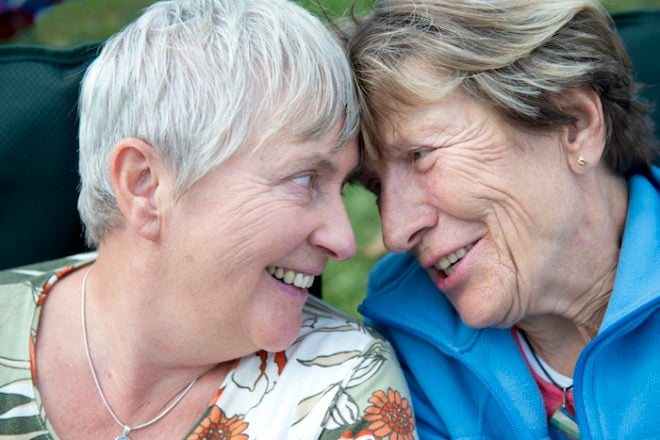
As the population of LGBTQ+ older adults continues to grow, many of them face significant challenges related to social isolation, finding affordable and inclusive housing options. Also, a lack of LGBTQ+-specific programs and culturally competent support services exacerbates these issues. Photo: iStock/EyeJoy.
As the population of LGBTQ+ older adults continues to grow, many of them face significant challenges related to social isolation, finding affordable and inclusive housing options.
Also, a lack of LGBTQ+-specific programs and culturally competent support services exacerbates these issues.
Mary Thompson, a 72-year-old lesbian, recently moved into an LGBTQ+-welcoming senior housing community in San Francisco. She had been living alone and struggling with loneliness after her partner of 30 years passed away.
“It was so isolating being by myself after Ruth died,” Thompson said in a study from the International Journal of Environmental Research and Public Health. “I didn’t feel comfortable being open about my identity at the few social activities in my neighborhood. Moving here has been life-changing – I finally feel like I can just be myself.”
LGBTQ+ seniors face challenges
LGBTQ+ seniors are twice as likely to live alone compared to their non-LGBTQ+ peers, putting them at greater risk for social isolation, according to a report from SAGE, an LGBTQ+ seniors advocacy group.
This isolation can have severe negative impacts on physical and mental health, including increased risks of cognitive decline, depression, and elder abuse, according to a report from the Movement Advancement Project.
“We’ve made progress in recent decades, but discrimination and a fear of being open about their identities still leads many LGBTQ+ elders to become isolated and disconnected from communities,” said Hilary Meyer, director of SAGE, a national advocacy group for LGBTQ+ elders.
Learn more about these issues at the Honor Our LGBTQ+ Elders Day community forum. It will take place Thursday from 3 to 5 p.m. at Being the Church, Long Beach Grace UMC.
Hosted by the Cal State University Long Beach Gerontology Program, the workshop takes data on LGBTQ+ older adults to help understand historical barriers and disparate treatment of this community. Discussion topics will include trauma, caregiving, networks, education, and next steps.
This forum will also have support resources.
RSVPs are encouraged, but are not required.
Marsha Wetzel, lesbian senior, wins LGBTQ housing discrimination case
‘Pre-liberation’ generation
The first generation of openly LGBTQ+ older adults, often referred to as the “pre-liberation” generation born before 1960, faced significant challenges due to growing up in an era when homosexuality was stigmatized and discriminated against.
This generation came of age when homosexuality was classified as a mental disorder and gay civil rights were not recognized.
They lacked legal protections against discrimination in employment, housing, and accessing services, leading to difficulties building financial security and social support networks for old age.
Staying in the closet
Experiencing widespread societal disapproval and discrimination led many to internalize shame and homophobia. This made it difficult to be open about their identities and build supportive communities.
Disapproval from biological families was common, resulting in a lack of family support systems that heterosexual peers could rely on in old age. Many had to create “families of choice” for social connection, according to various studies.
Fear of discrimination and unwelcoming environments made this generation hesitant to access aging services, healthcare, and long-term care facilities, even if policies changed later in life.
Providers often lacked training to meet their unique needs.
Smaller social networks due to historical oppression, combined with strained family ties, put this generation at higher risk of social isolation and loneliness in old age.
While some developed resilience and coping strategies, the “pre-liberation” LGBTQ+ elders navigated unique challenges stemming from a lifetime of marginalization that younger generations did not face.
Housing difficult to find
Finding affordable, welcoming housing is a major obstacle. While more LGBTQ+-focused senior communities have opened, they are often costly and inaccessible for low-income elders, according to the International Journal of Environmental Research and Public Health study.
Discrimination in the general housing market also remains an issue, with a survey finding one-third of LGBTQ+ elders worried about having to hide their identity from housing providers, according to a study from the Center for Health Care Strategies.
“I was so anxious about moving into a typical senior home and having to go back into the closet after being out for decades,” Thompson said. “Places like this community are vital for our wellbeing as we age.”
Even when LGBTQ+ elders can access housing and home-based services, providers frequently lack training in LGBTQ+ cultural competency, creating barriers to person-centered care, according to the Center for Health Care Strategies study.
“Too often, LGBTQ+ elders face discrimination, insensitivity or just a lack of understanding from support staff,” Meyer said. “We need more funding for LGBTQ+-specific programs and better training so all older adults can age with dignity and respect.”
